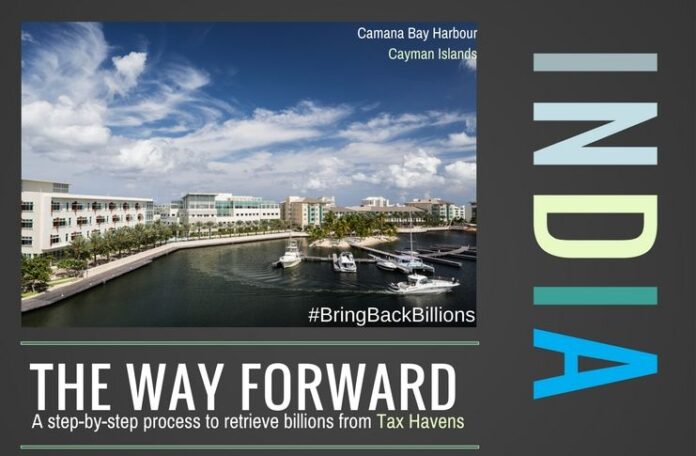
The story thus far…
In a speech Dr. Swamy gave at the Indian Merchants Chamber, Mumbai on June 16, 2016, he talked about the four ways in which the Black Money stashed abroad can be brought back to India. The most comprehensive way to get it back is to pass a law nationalizing their assets abroad. Once this law is passed, the UN resolution can be used to get the details of the accounts from any tax haven. Philippines, Egypt and Libya have already taken this approach. Each country’s experience has been different and has been detailed as follows:
- Philippines – #BringBackBillions Part 2 – How Marcos made his billions, and #BringBackBillions Part 3 – Recovery using PCGG
- Egypt – #BringBackBillions Part 4 – Egypt and its missing billions, and #BringBackBillions Part 5 – Recovering the wealth of Mubarak
- Libya – #BringBackBillions Part 6 – How Gadhafi looted Libya, and #BringBackBillions Part 7 – Recovery process after Gaddafi
In Part 8 titled How should India proceed to get back billions from Tax Havens…, we traced the ways in which money gets stashed in Tax Havens and how layering is done to make it difficult to trace the owner. Here is a brief re-cap of the United Nations Convention against Corruption Treaty.
United Nations Convention against Corruption Treaty
The United Nations Convention against Corruption (UNCAC) is a landmark, international anti-corruption treaty adopted by the UN General Assembly in October 2003. It represents a remarkable achievement: a global response to a global problem. With 145 countries bound by UNCAC so far, it is unique not only in its worldwide coverage but also in the extent of its provisions, recognizing the importance of both preventive and punitive measures. Of all the chapters in this document, the one that deals with illegal assets is detailed in Chapter 5 – Asset recovery. While Chapter 5 waxes eloquent by laying a framework for countries to adapt both their civil and criminal law in order to facilitate tracing, freezing, forfeiting, and returning funds obtained through corrupt activities, it leaves the door open in terms of tackling political corruption, i. e. the acquisition of illegal assets of Politically Exposed Persons (PEP).
India was a reluctant signatory of this treaty. Why reluctant, you ask? India signed it in 2003 but ratified it only in May 2011! This research paper INDIA: Incentives for corporate integrity in accordance with the UNCAC is detailed, thorough and revealing. It does most of the hard work in laying out what areas of the legislation in India, especially after the Companies Act 2012 changes covers the conditions laid out in UNCAC. The good news is that most of the laws in India are already there. Since all are equal before the eyes of law, it is important to ensure that the new legislation, based on Fali Nariman’s proposal can be the starting point:
- Pass an Ordinance, Nationalization of Illicit wealth held in tax havens, which will provide for the acquisition of the foreign currency accounts held outside India. It must include PEPs too.
- Government will appoint a custodian for such accounts. In effect, nationalize those funds with the specific provision that the custodian will release the money of people who can prove that it was officially remitted from India. The title will then re-vest in them. All this has nothing to do with tax treaties. This is not a tax matter.
- Once the law is passed, the custodian will write to the foreign authorities to say that now I am the holder of all accounts (as per India’s law) and please give me the list of the Indians whose accounts are with you.
The Way Forward
The interactive graphics below show the four steps that the Indian Government needs to take in order to succeed, in my opinion. Mouse over any image for further details.
If India’s actions have to be summarized in one word, it is closure. India needs to do closure. From repairing a pothole to make it completely on the same level as the surface around it to delivering justice in a timely manner, the art of closure needs to be mastered.
Tax havens are not going to just hand over the money – India’s courts will have to prove that they can render effective, speedy justice. India needs to act on getting more judges appointed at every level (be it District Court , High Court or Supreme Court). One suggestion by Dr. Subramanian Swamy of appointing retiring Supreme Court judges as Appellate Court judges is a start. This also mandates that Supreme Court justices should be appointed for life, as in the United States. Such bold measures would send the world the message that India is serious about getting back its wealth.
Click here for the complete coverage on #BringBackBillions
- Indian Parliament’s Special Session is convened to mark the shifting to new Parliament building - September 3, 2023
- Why did Rajat Sharma of India TV not declare that Adani owns more than 16% shares in his channel? - January 29, 2023
- Prannoy Roy to get Rs.605 crore from Adani as per Stock Exchange filing. Why is Income Tax not acting on Roys’ dues of over Rs.800 crore? - January 4, 2023











The I’ll gotten wealth stored away in off shore accounts,largely belongs to political class. They are reluctant to bring such legislation or law, which will expose them and lose their I’ll gotten wealth.
Beautiful , well researched, thought provoking yet very easy to follow great article
Well written and researched article! It will be useful to understand what, if any, political impediments stand in the way of the Government moving forward with these proposals. Given that Dr. Swamy is now a Rajya Sabha member, and exerts a strong influence on the Central Government, what else stands in the way of these steps being taken?